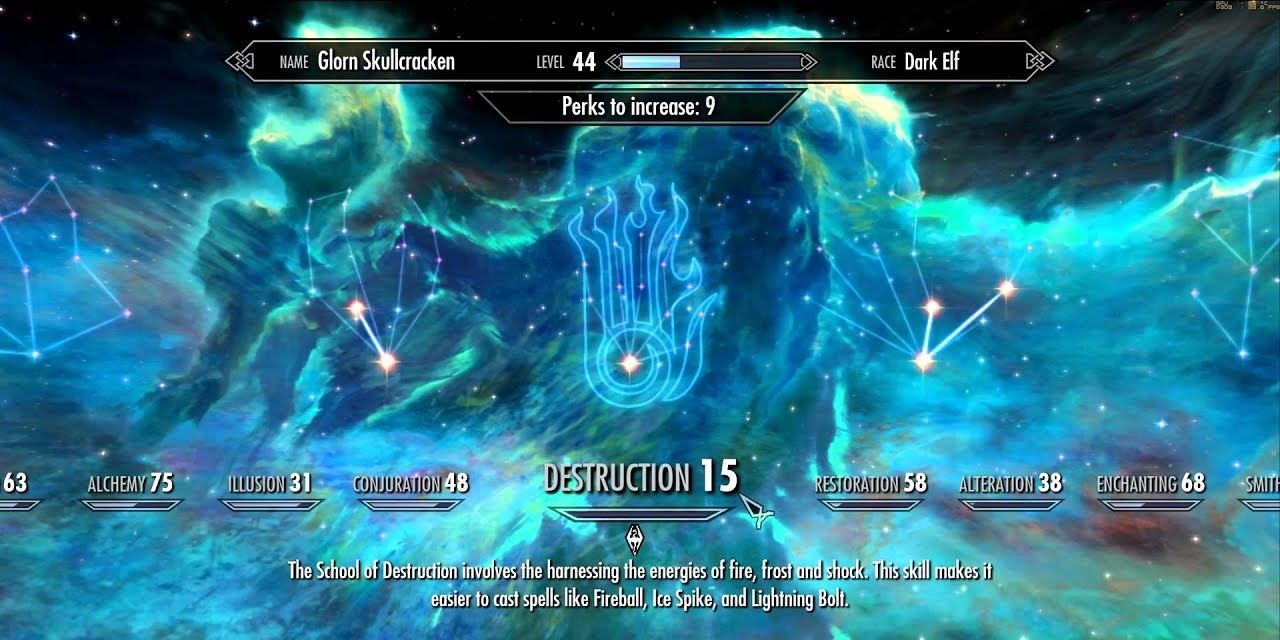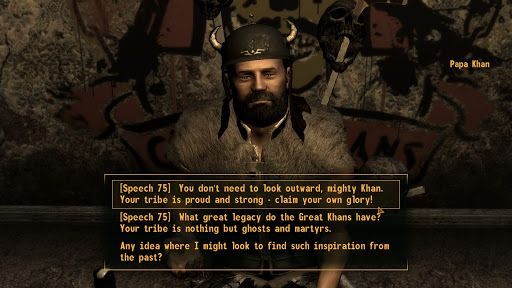The Elder Scrolls 6 Would Do Well to Look Back at One Fallout: New Vegas Feature

The Elder Scrolls 6 is on the way, but there’s been little news about the Skyrim sequel since it’s initial announcement back in 2018. Bethesda is currently working on a new IP, Starfield, set for release before the next Elder Scrolls, so it’s likely fans are still in for a significant wait.
Even if The Elder Scrolls 6 is years away, that might not be such a bad thing. Bethesda will have more time to make sure the game is truly ready to succeed Skyrim and step out from under its significant shadow, and one way the studio could do that is by incorporating one small feature from Fallout: New Vegas which has a huge impact.

Skills have been a fundamental part of RPGs since their inception. In Dungeons & Dragons, for example, skill modifiers help boost the possibility of a character succeeding at certain tasks by adding a base number on top of any d20 roll the player makes. This influenced early video game RPGs as well, with many games incorporating a similar system where skills operate as a modifier to an otherwise random roll of the dice.
While on the surface video game RPGs appear to have kept a similar system, the minor differences made over the years have had significant impacts that radically alter the played experience of different RPGs. This can clearly be seen when comparing games like Skyrim and Fallout: New Vegas. Despite both being open-world RPGs owned by Bethesda, the way these games handle skill checks has a huge effect.
In Skyrim, every player starts the game with the same base stats, aside from those modified by race. Unlike most RPGs, even older Bethesda games, there is no point during Skyrim’s character creation where players have to choose which stats their Dragonborn will specialize in. This was part of a larger move made in Skyrim to simplify the RPG format and make it more accessible.
From there, a Skyrim player increasing their level in any given area by performing the task that skill deals with. To improve at one-handed weapons, the player needs to use one-handed weapons. To make lockpicking increasingly easy, the player needs to pick a lot of locks. Improving in different Skyrim skills then allows the player to unlock buffs in a skill tree. For example, by using a bow and arrow enough, the player can increase their archery skill to the extent that drawing back their bowstring slows down time.

Fallout: New Vegas, however, uses a subtly different system. Simply put, Obsidian Entertainment made the player’s level of skill in a given area work like a checkpoint. It’s impossible to even attempt to hack an “Easy” level computer in New Vegas without a skill of 25 in science or higher. Similarly, it’s impossible to pass a speech check of 50 with a 49 in speech, no matter how many times the player tries. This was a small but significant change from Fallout 3, where some abilities like speech checks operated on a percentage of probability in a way more reminiscent of the Dungeons and Dragons style. The level of skill helped increase the probability of an otherwise random roll going the player’s way.
The Fallout: New Vegas skill system ultimately makes for a more compelling and rewarding gameplay experiences, while also giving the game greater replay value than it might have otherwise had. The Skyrim system leaves most Skyrim players finding themselves a jack-of-all-trades whether they like it or not. Skyrim even starts all players with the “Heal” spell, meaning even those who want a main melee build will have some skill in magic.
Skyrim’s system makes things like learning spells, picking locks, and even combat feel less rewarding by making it more of a war of attrition than it is a reflection in the player’s investment in the game. Playing New Vegas as the Courier with 100 in lockpicking requires investing significantly in that skill at the direct cost of other skills, whereas the Skyrim system not only improves the player’s abilities based on every skill they attempt, but also never blocks off a player from attempting something.
As a result, a lower level player with enough lockpicks and patience can still open almost any door in Skyrim. There are far fewer cases where a player finds a locked door and has to return at a far higher level in order to see what’s behind it. Yet, this is exactly the sort of mysterious and compelling experience the Fallout: New Vegas player can have when dealing with high level locked doors like the one leading into the Brotherhood of Steel bunker in the Hidden Valley.

Lockpicking is just one example, but it stands to make a particular point. Skyrim’s skill system unlocks far too many doors to the player, which incentivizes the player to be a jack-of-all-trades rather than going through the rewarding experience of investing in certain skills and seeing that investment pay off in exclusive experiences.
The Elder Scrolls 6 can’t just be a sequel to Skyrim – Bethesda will need to find ways to take the Elder Scrolls formula and make it more satisfying to experience than ever before. Subtly adjusting the way the game deals with skill calculations behind the scenes could be a great first step, making the overall experience more rewarding while also helping to diversify the experience of playing through with different specializations.
Perhaps Starfield will provide an opportunity to experiment with some of these changes before The Elder Scrolls 6. Either way, reworking the skill system could preserve the freedom of Skyrim’s open-world while making it more compelling to explore.
The Elder Scrolls 6 is in development.

Post a Comment